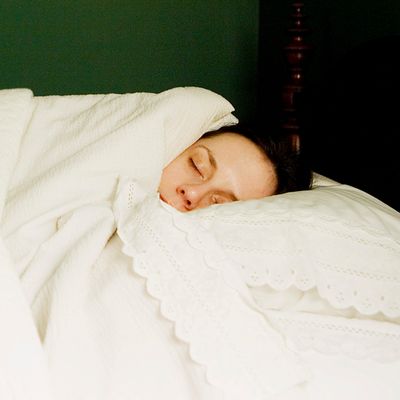
Sleep is one of the few tenets of wellness that I actually care about. That’s because it is the easiest one: Telling someone to go to sleep is like telling them to please hold onto these puppies for a few hours. It’s fun. It’s restorative. It’s stress-free. You want me to fall asleep right here, right now? Try me. I will.
But just because I like to sleep and I find it easy to fall asleep doesn’t mean I’m sleeping well. The current hot-button topic about the lifestyle choices of America’s overworked masses is how little quality sleep we’re getting. Arianna Huffington loves it, women aren’t getting enough of it, and we’re all too committed to hours clocked in at the expense of thinking about the ones tucked in.
Lack of sleep has been connected to obesity, mental-health problems, and other chronic diseases. When people don’t sleep enough, they tend to be in worse moods, find work impossible, and have a shorter lifespan. But for many people, making concrete changes to sleep better seems impossible.
The National Sleep Foundation recommends a few steps in order to get a good night’s sleep: Stick to a schedule, have a nighttime ritual, wind down, avoid alcohol, and exercise daily. Arianna Huffington, whose new book The Sleep Revolution has been taken to task for suggesting a sleep ritual that would seem to be available only to those with royal bloodlines, suggests a few more essentials: hot baths, candles, elegant sleepwear.
In trying to feel better rested myself, I decided to assess and improve my own sleep habits. For two weeks, I made incremental changes to my nighttime rituals, what little of them I had. I found some things that I was happy to adjust, while others remained steadfast habits. I haven’t bought any fancy nightgowns, but I did find five far easier tweaks to my bed behavior that have had a not insignificant impact on my daytime hours.
1. I stopped looking at my phone or my computer at least an hour before bed. A wide range of research shows the detriments of staring at artificial light before going to sleep. Ninety-five percent of Americans crib to looking at some sort of screen in bed at night, which messes with our circadian rhythms and deprives us of melatonin, a natural sleep-promoting hormone our bodies produce. When I start getting ready to go to sleep, I plug my phone in on a table in the corner of my room, shut down my laptop, and don’t think about either of them until the next morning. It’s not as fun as say, scrolling through the Instagram explore page with the lights out, but it’s made a big difference in my quality of sleep.
2. I got a real alarm clock. Moving my phone away from my bed means I can’t use my phone as an alarm clock anymore, but that was really messing me up anyway. I used to set 16 different alarms, minutes apart, putting a premium on having a loud obnoxious noise blaring in my ears. The result was that I would always wake up, fall back asleep, and wake up again not much later feeling very poorly rested. Now that my phone is across the room, I found several healthier alternatives, like high-tech clocks. A “smart” clock called Sense, which I used for a trial period during my sleep experiment, determined how well I was sleeping and woke me up with a quiet, sweet melody at a preselected range of times, say between 7 and 7:30 am. I found that I woke up the first time it rang, and I never felt drowsy enough to fall back asleep, which helped me feel rested during the day.
3. Despite my initial protests, I got rid of my old mattress and bed frame. The bed frame my mattress was on was too noisy, even when I was lying completely flat and still. (My preferred method of existing.) So I got a cheap but solid bed frame from Ikea and a Casper queen-size mattress. I don’t know if it’s the lack of springs in the mattress, or the lack of squeak in the bed frame, but the upgrade made all the difference — I stopped waking up in the middle of the night to the sound of my own shuffling. Quiet sleeping is comfortable sleeping.
4. I read before bed until I fell asleep. It works, I promise.
5. I lowered my coffee and alcohol intake. This was the hardest change to make, but hey, it’s worth it. My strategy is simple: Coffee in the morning, a tea or something less aggro around noon or one, and then no more caffeine for the rest of the day. If I’m going to drink alcohol, I make sure it isn’t too close to bedtime. While there are few greater joys than a nightcap before bed, studies have shown that drinking at night is a guarantee of a poor night’s sleep. So I just cut back. The effect was that I started feeling a natural sleepy stasis by the time I was ready to get in bed.
There were a few other action items on my list that I tried but couldn’t do routinely. I don’t make my bed every day, even though experts say that turning down the sheets to get into bed can help in getting better sleep. I also don’t manage to work at my desk every morning after waking up. I worked in bed more often than I worked out of bed for the first part of the morning. I also beeline directly to my phone in the morning, which is a strict no-no in Huffington’s Sleep Revolution. But after eight hours apart from it, you kind of miss it, you know?




